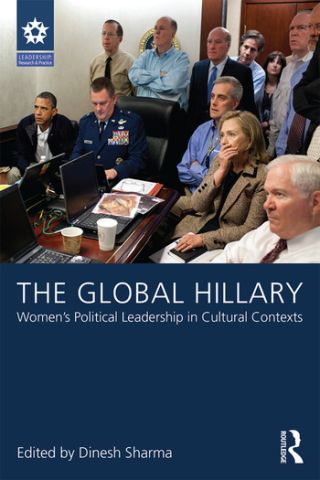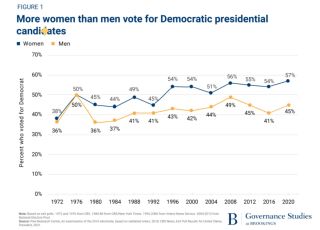Politics
Democracy and Gender Politics
The influence of Hillary, Harris, and Haley.
Updated March 6, 2024 Reviewed by Lybi Ma
Key points
- Gender psychology is key to American politics.
- Restriction in women's reproductive rights will impact the elections.
Nikki Haley only won Washington, D.C., and Vermont in the primary elections last night and has suspended her campaign this morning.
Kamala Harris and Nikki Haley claim Hillary Clinton, the first female presidential candidate, as one of their heroes. When Hillary Clinton announced that "women's rights are human rights" at the Beijing Conference in 1995, no one could have predicted that two first-generation South Asian immigrant women would pick up the mantle and run the race for gender equality.

Even though they belong to different generations and political orientations, the diversity of these female candidates represents the emerging field of greater participation by women in U.S. politics, which is a good sign for democracy, notwithstanding that the women's rights movement has taken a major hit due to the Dobbs decision that reversed 50 years of legal precedence of women's reproductive rights.
In 2022, women scored a record number of congressional (29 percent) and senate seats (25 percent), yet this may not be enough to reverse the conservative tide against women's rights.
A national candidate will not likely win a general election without women's support, especially without the suburban women's vote. Today, suburban women feel threatened by the recent restrictions on their reproductive healthcare.
Psychological studies have suggested that the "intention to vote for male candidates increased with age until candidates were about 45 years old and then slightly decreased." For female candidates, conversely, the intention to vote seemed to consistently decrease with a candidate's age. "Perceived attractiveness" and "warmth" may lead to some gender differences in the effect of candidates’ perceived age.
Psychological research also suggests a linkage between ovulation, religion, and political attitudes. "Ovulation led single women to become more liberal, less religious, and more likely to vote for Barack Obama." In 2012, those who voted for Mitt Romney, in contrast, were women in committed relationships, more conservative, and more religious. Do ovulation-induced changes in political orientation mediate women’s voting behavior? Possibly. It may not be far-fetched to suggest that, according to the research, "the ovulatory cycle not only influences women’s politics but also appears to do so differently for single women than for women in relationships."

Rebecca Deen, a professor at UT Arlington, explained recently that politicians do things and land in the news; and the topic that they want settled is discussed even more. It is at the top of mind for voters and then becomes more problematic for the politicians.
Suburban women are also the key economic decision-makers in many American households. While women have generally voted Democratic, white women tend to vote more conservatively than women of color, according to data from Rutgers University's Center for American Women and Politics. Will this trend continue to hold in the upcoming election as women's rights are increasingly under threat?
The overall gender gap tends to lean democratic by a huge margin, but not necessarily for white, married, and evangelical women. How will this demographic trend play out this election season with increasing restrictions on women's healthcare and the potential national ban on abortion rights? Nikki Haley potentially spoke to these women's voices. Now, the Biden-Harris ticket will have to speak to the concerns of these women voters to allay their fears about protecting women's rights.


